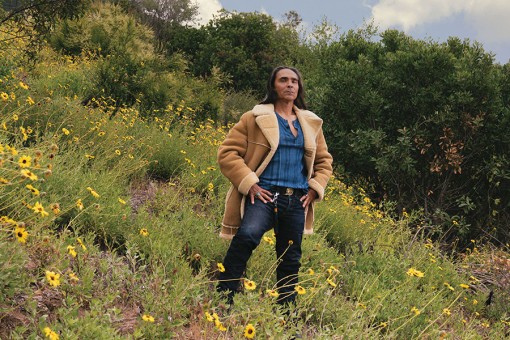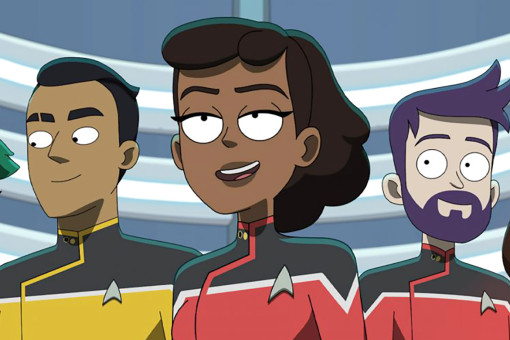Christine Baranski's Diane Lockhart might be the heart of The Good Fight, a spin-off of the long-running drama The Good Wife, but Audra McDonald's Liz Reddick is a close second.
Sure, Diane has had her struggles, starting when she first abandoned her retirement plans to start over at a new law firm after losing her life's savings. But starting in the second season, powerhouse attorney Liz Reddick — who had appeared briefly on The Good Wife — joined the firm, creating interesting wrinkles for all concerned.
Over the course of six seasons (now streaming on Paramount+), the men fell off the letterhead, and Diane and Liz emerged as the two partners in charge of the firm, and Baranski and McDonald as the two leads of the show.
Diane eventually realized that Liz — a Black woman — was far better suited to lead a Black firm than she was, and willingly stepped aside. Liz's rise to the top also created a space in which McDonald (a Broadway mainstay) could make an appeal to customize her character. McDonald was concerned that there was "a little bit too much Angry Black Woman" in Liz, so she went directly to co-creators Robert and Michelle King. As a result, she says, they took Liz in a different direction, showing more of her home life. They also reshaped her struggle with a new rival, Andre Braugher's character, Ri'Chard Lane.
After watching Liz for years, audiences have finally gotten to know the character a little better this season. Outside of work she lives the mundane life most of us do — making burgers for her son and trading fan theories about reality shows. But the most interesting thing about her extracurricular activities is that the ideas for them came from McDonald.
Here, the actress talks about collaborating with the Kings, tackling difficult topics and her reaction when The Good Fight wrapped.
This is a show that has explored intersectionality. Liz, for instance, had to decide whether she wanted the firm's identity to be that of a woman-run firm, or a Black firm.
Yes. That was the crux of all the tension between Diane Lockhart and Liz Reddick last season. It's a question that a lot of people face in the workplace, in terms of this reckoning that was precipitated by the murder of George Floyd and then by Black Lives Matter. How do we begin to dismantle systemic racism? In what ways can we do something about it? Diane argued that women need to fight this battle together. But Liz came to the realization that the company had been established as a civil rights law firm — a Black firm. And there are a lot of sticky situations, a lot of gray areas, in terms of what people think about that. I commend Robert and Michelle King for not running away from it, and for going to that third rail.
What's it been like collaborating with the Kings? Have you had any moments where you've pushed back and said, "I don't think Liz would do this"?
In the season where Liz finds out that her father was a serial rapist, there was a scene where Liz speaks to one of her father's victims — an older woman — and they had me swearing. Now, Liz has a mouth on her, but she would never, ever use that kind of language with certain Black people. So I had to say, "No, no, no. I'm sorry, but that just wouldn't happen. We have to find a different way."
How did stories evolve as a result?
In this season, I felt there was perhaps a little bit too much Angry Black Woman in Liz. I was really concerned about that trope being a little too present. Liz, as the head of the firm, is the one having to do the most fighting, and I was starting to feel that she was fighting everything — that there was no other aspect to her. So after a couple of scripts, I sat down with the Kings and said, "I'm not comfortable with this." And they absolutely took my character in a different direction. I was very pleased with that. I just needed to gatekeep in terms of making sure Black women are represented in a way that doesn't perpetuate any stereotypes. Not that they were perpetuating any, but my instinct said, "Let's guide away from this."
So that changed some other aspects of who Liz is. We turned down the temperature on Liz always fighting the world. I said, "Where's her kid? Let's delve into that, what it's like to be a parent of a Black son in this day and age." So you see Liz spending a lot more time with her son, Malcolm.
How cathartic was it for you to vocalize some of Liz's arguments?
Oh, absolutely the stuff about voter suppression. Liz has a really lovely monologue where she explains all of that. I was very pleased to be that voice. I also really like being able to be the one to talk about how to break down systemic racism. I see those storylines come through, and I'm like, "Oh, good. We're going to address this, in all of its messiness." I don't think there's any topic that The Good Fight shied away from.
What was it like when the show wrapped, and you realized this was all ending?
My first season of The Good Fight my daughter was not a year old, and she's almost six now. So as amazing as it's been doing the show, being the mother of a baby and then a toddler during it was really hard. There was a part of me that was sort of relieved when we were told it was over. Because not only do you have crazy hours with TV, but with a baby and then a toddler who wasn't sleeping through the night, there were times when I was getting maybe eight hours of sleep a week. It was exhausting. But when they said, "That's a series wrap," I was surprised that I cried. I was more emotional than I thought I would be. It's been an incredible experience, one that I've been honored to be a part of. But part of me really was looking forward to having a little more breathing room!
Robert and Michelle King are showrunners and executive producers of The Good Fight, which they cocreated with Phil Alden Robinson. In addition to the Kings and Christine Baranski, the series' executive producers include Ridley Scott, David W. Zucker, Liz Glotzer, William Finkelstein, Jonathan Tolins, Jacquelyn Reingold and Nelson McCormick. The Good Fight is produced by CBS Studios in association with Scott Free Productions and King Size Productions.
An edited portion of this interview appeared in emmy magazine issue #11, 2022.
For more on The Good Fight, click here.


















